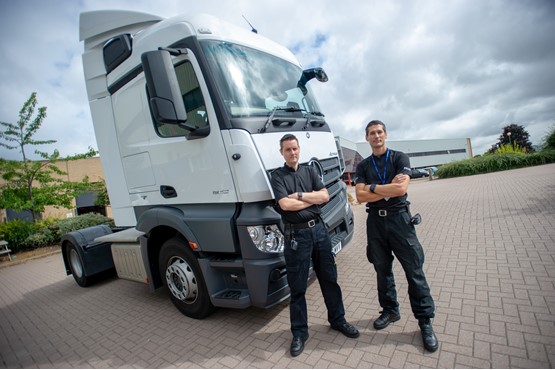Police have caught scores of dangerous drivers on the M1 using Highways England’s unmarked HGV ‘supercabs’ in a week-long operation.
The supercabs were used by six police forces and recorded almost 200 offences, including 57 drivers on mobile phones, 37 not wearing seatbelts and 26 who were driving carelessly or not in proper control of their vehicles.
Police officers filed 133 traffic offence reports – usually requiring drivers to attend a driver education course – and there were also five prosecutions for more serious offences.
One of the unmarked HGVs previously caught a lorry driver using a credit card to make a payment on his mobile phone.
Northamptonshire Police was one of the forces involved in the week of action. PC Dave Lee from the Safer Roads Team said: “Our main priority is to reduce the number of people killed or seriously injured on our roads by clamping down on the fatal four offences, which are speeding, drink/drug driving, seatbelt and mobile phone use.
“Working with our partners on such operations enables us to take a strong and robust approach to identify road traffic offences.”
The number of incidents during the Highways England initiative, which took place from May 13-19, fell from 90 collisions during the previous week to 64 during the week of action.
Highways England’s traffic officers also joined forces with the emergency services to provide free tyre checks and safety tips to hundreds of drivers at motorway services along the M1.
Similar safety initiatives are now being planned for other motorways across England following the success of the M1 week of action.
Richard Leonard, head of road safety at Highways England, said: “We’ve been really impressed with the results of our week of action on the M1, which shows how making little changes to the way you drive can make a big difference to safety on our motorways.
“Our HGV supercabs helped the police identify almost 200 dangerous drivers who could have caused collisions if they hadn’t been pulled over, and our safety tips at motorway services and in the media also helped to make the M1 safer for everyone.
“As part of our current motorway driving campaign, we’re encouraging drivers to remember the basics of motorway driving to help keep us all moving so that the number of accidents continue to fall in the weeks and months ahead.”
 Photo caption: PC Dave Lee and PC Rob Monk from Northamptonshire Police's Safer Roads Team with one of the HGV supercabs. Picture courtesy of Northamptonshire Police
Photo caption: PC Dave Lee and PC Rob Monk from Northamptonshire Police's Safer Roads Team with one of the HGV supercabs. Picture courtesy of Northamptonshire Police
The HGV supercabs, which are funded by Highways England, allow police officers to film evidence of unsafe driving behaviour by pulling up alongside vehicles, and drivers are then pulled over by police cars following a short distance behind.
They have derestricted speed limiters which mean they can travel at speeds up to the national speed limit, and flashing lights have been installed for use by police forces in an emergency.
Highways England told Fleet News earlier this year that the three unmarked HGVs had recorded more than 3,500 offences patrolling motorways and major A roads across England in the past year.
Police officers issued 462 penalty charge notices and filed 2,533 traffic offence reports – usually requiring drivers to attend a driver education course. There were also 73 prosecutions for more serious offences.
Tom Cotton, the Road Haulage Association’s head of licensing and infrastructure policy, said: “A minority of drivers think it’s okay to endanger other road users by taking unnecessary risks behind the wheel – it’s not. No phone call or text is so urgent that it can’t wait until the driver is safely parked.
“We’re pleased to see police and Highways England working together on initiatives to improve road safety.”
A new Highways England safety campaign is currently taking place highlighting the basics of motorway driving, including what to do if you break down, keeping left except when overtaking, and obeying red X and variable speed limit signs.
Red Xs are displayed on overhead electronic signs to close lanes for several reasons, including an accident or breakdown, debris in the carriageway, or because of a person or animal on the road. Lanes are also closed to help emergency services get through or to provide a safe space for road workers.
More details on the campaign are available at www.highwaysengland.co.uk/motorways.























Sage & Onion - 15/08/2019 12:22
Whilst its certainly not excusable, the truck driver making a payment on his credit card could possibly have been paying something like the Dartford Toll or Merseyflow toll because he feared he would forget and get a fine. One way to combat the temptation for drivers to do this, and contribute to road safety, would be for the toll operators to extend the payment period to 7 days rather than just the 24-48-hour period they give now. This time could be critical for drivers on tramping operations where they are away from base for the whole week and need all their non-driving activity for rest and recuperation or have limited access to facilities to catch up on admin. So they are tempted to pay on the go so to speak so they can rest when stopped.